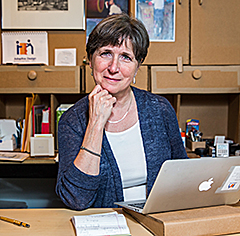Published: December 2015
In 1981, Alex Truesdell‘s aunt Lynn Valley suffered a spinal injury that left her hands paralyzed. Watching (and helping) her uncle turn inexpensive, readily available materials into devices that enabled Valley to accomplish her daily activities inspired Truesdell to do the same for students at the Perkins School for the Blind in Watertown, Massachusetts, where she worked. She began by crafting individual-specific pieces in her basement and went on to found and lead the school’s Assistive Device Center. In 2001, Truesdell established the Adaptive Design Association (ADA), a nonprofit based in New York City that conceives and builds furniture and other implements for physically-disabled children and adults, each piece tailored to a particular individual’s needs—a belted seat that allows a child lacking the muscles to sit to join her class on the floor for reading circle, for example, or collapsible stairs for positioning before a sink. Most ADA creations are made out of corrugated cardboard (see Truesdell’s office furnishings in the accompanying photo). The material is ubiquitous, cheap, and easy to work with, says Truesdell, and, glued in layers, it can support as much as a thousand pounds.
On the afternoon of September 8, Truesdell received a phone call informing her she had been chosen to receive one of the 24 MacArthur Foundation fellowships of 2015, commonly referred to as the genius award. Under her leadership, ADA is currently helping to develop counterparts in Europe, India, and Latin America. Describing ADA’s designs and construction techniques as “open source,” she says, “Everything we do here, we want to make sure can happen globally.”
- Adaptive Design Association (ADA) website
- Video profile of Truesdell from the MacArthur Foundation
- Among the Giants, a 23-minute film about ADA
- “Using Cardboard to Bring Disabled Children out of the Exile of Wrong Furniture,” New York Times, July 29, 2014
- “NYC Adaptive Design Group for Special Needs Kids Set to Expand Globally,” Huffington Post, January 21, 2011

